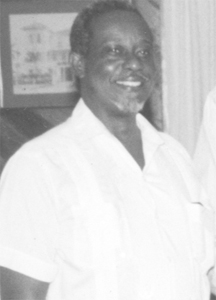Although the recall legislation prevents Members of Parlia-ment from permanently crossing the floor, the onus will be on the opposition in the 10th Parliament to ensure that its members do not vote against their respective parties.
With the opposition parties only having a one-seat advantage over the government, political observers have noted that their Chief Whips would have important roles in the proper functioning of the House. The Chief Whips of parties generally keep their party representatives in line for voting and interface with the Speaker, Clerk and staff on a direct basis on behalf of the parties.
Haslyn Parris, who has researched Guyana’s constitution extensively, opined that the role of the Chief Whip would be pivotal in the upcoming parliament given that this is “the entity that is supposed to get people into the condition of what they should or shouldn’t do or support.” He noted though that it is quite possible for the influence of the Chief Whip to be eroded if a member decides to go against a particular instruction handed down. “The Chief Whip’s influence could be zero or totally pivotal,” Parris said. According to him, the influence that a Chief Whip depends a lot on who the individual is and the conditions under which this person was selected.

APNU Leader David Granger recently told Stabroek News that he does not feel that the expected configuration of the National Assembly will enhance the importance of the Chief Whip but instead place greater emphasis on enhanced policy cooperation by the parties in parliament. He said that in this regard, the cooperation of his party and the AFC will be extremely important. He said though that he did not see the Chief Whips in the House taking on a diminished role.
“We anticipate a broad system in which all parties in the National Assembly will be able to arrive at prior cooperation and agreement on major issues [beforehand],” he said.
AFC leader Raphael Trotman previously told Stabroek News that he believes that in the next parliament both the APNU and the PPP/C will want to court the AFC. However, he thought it was expected that the AFC and the APNU “will have a firmer and better relationship based on mutual respect and parity. We will give as much respect as we receive.”
Contrary to Granger, Trotman feels that the role of the Chief Whips would be extremely important in this parliament. “In this 10th Parliament, the work of the Whips will be truly pushed to the limit as there is a one seat majority on the opposition side. A missing member due to illness or otherwise can have serious repercussions on either side,” he said. “Many ministers travel and I have no doubt that travel will be trimmed significantly,” he added.
In the last Parliament, the AFC had its own Whip and the party is likely to continue this tradition. The late Sheila Holder had served the AFC in this capacity.
If a parliamentarian does, however, go against the instruction of a party, he or she could also face possible recall by their respective party. The controversial recall legislation came into effect National Assembly passed with a two-thirds majority. The law, which had been proposed by the PPP/C administration, amended Article 156 of the constitution to allow for the recall of a member if he or she declares in writing to the Speaker or to his party’s Representative of the List that he/she will not support the list from which the name was drawn. Also, a member can be recalled if he/she declares in writing to the speaker or the representative of the list, or by their conduct or support for another list. Under this legislation, a member can also be recalled when the Representative of the List indicates in writing to the Speaker, that after meaningful consultation with the party or parties that make up the list that the party or parties have lost confidence in the member and the Representa-tive of the List has issued a written notice of recall to that member and forwards a copy of that notice to the Speaker.
The legislation was passed with the support of the PPP/C, the PNCR-1G and GAP/ROAR. The AFC did not support the bill. The proximate cause of the bill was the defection of three MPs—Khemraj Ramjattan, Trotman and the now deceased Holder—in the 8th parliament from the PPP/C, PNCR and GAP-WPA, respectively, to enable the formation of the AFC.
Trotman told Stabroek News that he felt the recall legislation may become a useful tool to the whips. “In the present construct, it is doubtful whether any party will want to push for its repeal as it may become the whips’ best friend,” Trotman remarked. The AFC, he said, vehemently opposed this particular piece of legislation because it believed that it was crafted “to plug a hole which opened up when we [he, Ramjattan and Holder] left our respective parties in 2005 to form the AFC.”
When questioned about the recall legislation, Granger declined to comment. He indicated though that he was not the leader of APNU’s list, rather it is PNCR Chairman Bishwaishwar ‘Cammie’ Ramsaroop.





